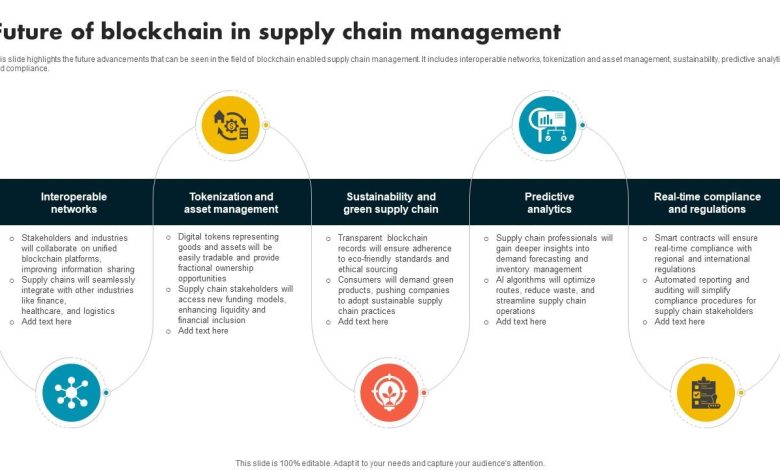The Future of Blockchain in Supply Chain Management

- Understanding the Role of Blockchain in Revolutionizing Supply Chain Management
- Challenges and Opportunities of Implementing Blockchain in Supply Chains
- Exploring the Potential Benefits of Blockchain Technology in Supply Chain Management
- Case Studies: How Companies are Leveraging Blockchain for Supply Chain Transparency
- The Impact of Blockchain on Traceability and Counterfeit Prevention in Supply Chains
- Future Trends: What to Expect in the Evolution of Blockchain in Supply Chain Management
Understanding the Role of Blockchain in Revolutionizing Supply Chain Management
Blockchain technology has the potential to revolutionize supply chain management by providing transparency, security, and efficiency throughout the entire process. By utilizing a decentralized ledger system, blockchain can track every step of the supply chain, from raw material sourcing to the final product delivery. This level of transparency helps to reduce fraud, errors, and delays, ultimately leading to cost savings and improved customer satisfaction.
One of the key benefits of blockchain in supply chain management is its ability to create a tamper-proof record of transactions. Each block in the chain contains a timestamp and a link to the previous block, making it nearly impossible to alter or delete information without detection. This level of security is crucial in industries where data integrity is paramount, such as pharmaceuticals, food, and luxury goods.
Furthermore, blockchain technology can streamline the supply chain by automating processes such as contract management, payments, and compliance checks. Smart contracts, which are self-executing contracts with the terms of the agreement directly written into code, can help to reduce the need for intermediaries and speed up transactions. This not only saves time and money but also minimizes the risk of human error.
Challenges and Opportunities of Implementing Blockchain in Supply Chains
Implementing blockchain in supply chains presents both challenges and opportunities for businesses looking to enhance transparency, efficiency, and security in their operations.
One of the main challenges of integrating blockchain technology into supply chains is the initial cost and complexity of implementation. Companies may need to invest in new infrastructure, train employees, and ensure compatibility with existing systems. Additionally, there may be resistance to change from stakeholders who are unfamiliar with blockchain technology.
However, the benefits of using blockchain in supply chains are significant. Blockchain can provide a secure and immutable record of transactions, reducing the risk of fraud and errors. It also enables real-time tracking of goods, leading to improved visibility and traceability throughout the supply chain. This can help companies optimize their processes, reduce costs, and enhance customer satisfaction.
Another opportunity of implementing blockchain in supply chains is the potential for increased collaboration and trust among partners. By sharing a decentralized ledger, companies can establish a single source of truth that all parties can access and trust. This can streamline communication, reduce disputes, and create a more efficient and resilient supply chain ecosystem.
In conclusion, while there are challenges to overcome, the opportunities of implementing blockchain in supply chains are vast. By embracing this technology, businesses can revolutionize their operations, drive innovation, and gain a competitive edge in the global marketplace.
Exploring the Potential Benefits of Blockchain Technology in Supply Chain Management
Blockchain technology has the potential to revolutionize supply chain management by providing transparency, security, and efficiency throughout the entire process. By utilizing blockchain, companies can track products from their origin to the end consumer, ensuring authenticity and reducing the risk of counterfeit goods entering the market.
One of the key benefits of blockchain in supply chain management is its ability to create an immutable ledger of transactions. This means that once data is recorded on the blockchain, it cannot be altered or tampered with, providing a high level of trust and security. This can help to reduce fraud and errors in the supply chain, ultimately leading to cost savings for companies.
Another advantage of blockchain technology is its ability to streamline processes and eliminate intermediaries. By using smart contracts, companies can automate tasks such as payments, agreements, and tracking, reducing the need for manual intervention and speeding up the overall supply chain process. This can lead to faster delivery times and improved customer satisfaction.
Furthermore, blockchain can enhance traceability in the supply chain, allowing companies to quickly identify and address any issues that may arise. This can be particularly useful in industries such as food and pharmaceuticals, where tracking the source of products is crucial for safety and compliance. By leveraging blockchain technology, companies can ensure that products meet regulatory standards and consumer expectations.
In conclusion, the potential benefits of blockchain technology in supply chain management are vast. From increased transparency and security to improved efficiency and traceability, blockchain has the power to transform the way companies manage their supply chains. By embracing this technology, businesses can stay ahead of the curve and gain a competitive edge in today’s fast-paced market.
Case Studies: How Companies are Leveraging Blockchain for Supply Chain Transparency
Several companies have successfully implemented blockchain technology to enhance transparency in their supply chains. Let’s take a look at some case studies:
- Walmart: The retail giant has been using blockchain to track the journey of its food products from farm to shelf. By scanning QR codes on the packaging, customers can access detailed information about the product’s origins, processing, and shipping.
- IBM: IBM has partnered with companies like Nestle and Unilever to create a blockchain-based system for tracing food contamination. This has helped in quickly identifying the source of outbreaks and preventing further spread.
- Maersk: The shipping company Maersk has implemented blockchain to digitize its paperwork processes, reducing the time and costs associated with documentation. This has streamlined the supply chain and improved efficiency.
These case studies demonstrate the diverse ways in which companies are leveraging blockchain technology to achieve greater transparency and efficiency in their supply chains. By embracing blockchain, businesses can build trust with consumers, mitigate risks, and optimize their operations.
The Impact of Blockchain on Traceability and Counterfeit Prevention in Supply Chains
Blockchain technology has revolutionized traceability and counterfeit prevention in supply chains. By leveraging the decentralized and immutable nature of blockchain, companies can now track products from their origin to the end consumer with unprecedented transparency and security. This has significantly reduced the risk of counterfeit products entering the supply chain, protecting both consumers and brands from potential harm.
One of the key advantages of blockchain in traceability is its ability to create a tamper-proof record of every transaction that occurs within the supply chain. Each time a product changes hands, a new block is added to the blockchain, containing information about the product, its location, and the parties involved in the transaction. This creates a transparent and auditable trail that can be used to verify the authenticity of products at any point in the supply chain.
Moreover, blockchain technology enables real-time tracking of products, allowing companies to quickly identify and address any issues that may arise. This level of visibility not only helps in preventing counterfeit products from entering the supply chain but also improves overall efficiency and responsiveness. By leveraging blockchain for traceability, companies can streamline their operations, reduce costs, and enhance customer trust.
In addition to traceability, blockchain also plays a crucial role in preventing counterfeit products from infiltrating the supply chain. The immutable nature of blockchain ensures that once a product is recorded on the blockchain, it cannot be altered or tampered with. This makes it extremely difficult for counterfeiters to introduce fake products into the supply chain without being detected.
Overall, the impact of blockchain on traceability and counterfeit prevention in supply chains is profound. Companies that embrace this technology stand to benefit from increased transparency, security, and efficiency in their operations. As blockchain continues to evolve and gain widespread adoption, its role in supply chain management will only become more significant in the future.
Future Trends: What to Expect in the Evolution of Blockchain in Supply Chain Management
As blockchain technology continues to advance, the future of supply chain management is poised for significant evolution. Several trends are expected to shape the landscape of blockchain in supply chain management in the coming years:
- Increased Adoption: More companies are likely to adopt blockchain technology in their supply chain processes to enhance transparency and traceability.
- Interoperability: Efforts are being made to ensure that different blockchain platforms can communicate with each other seamlessly, allowing for greater collaboration among supply chain partners.
- Smart Contracts: The use of smart contracts will become more prevalent, automating various aspects of supply chain transactions and reducing the need for manual intervention.
- IoT Integration: The integration of blockchain with Internet of Things (IoT) devices will enable real-time tracking of goods throughout the supply chain, improving efficiency and reducing errors.
- Data Analytics: Blockchain technology will enable better data analytics capabilities, allowing companies to gain valuable insights into their supply chain operations and make more informed decisions.
Overall, the future of blockchain in supply chain management looks promising, with the potential to revolutionize the way businesses track and manage their supply chains. By staying abreast of these trends and embracing the opportunities that blockchain technology offers, companies can position themselves for success in the rapidly evolving digital economy.



